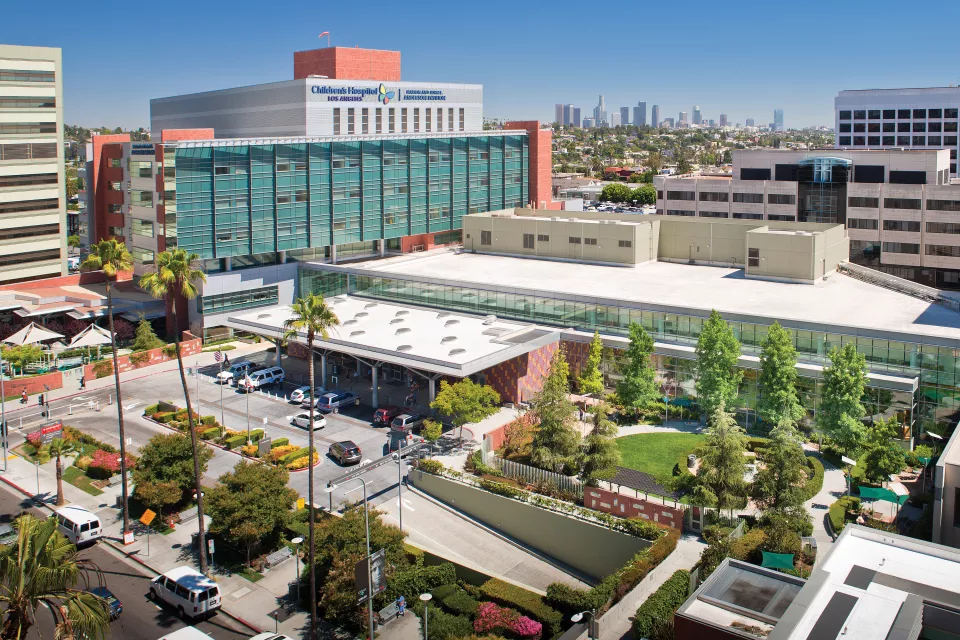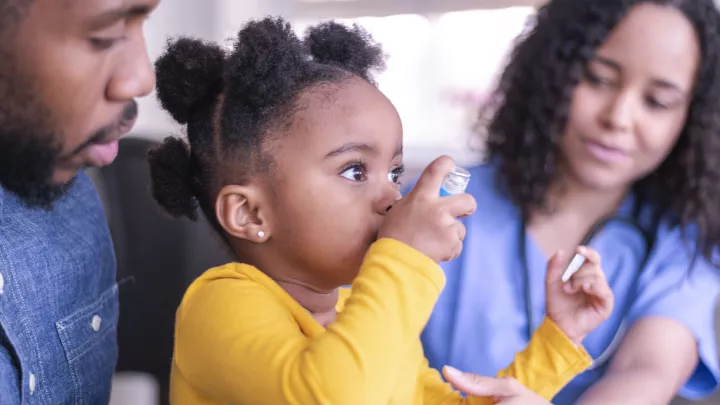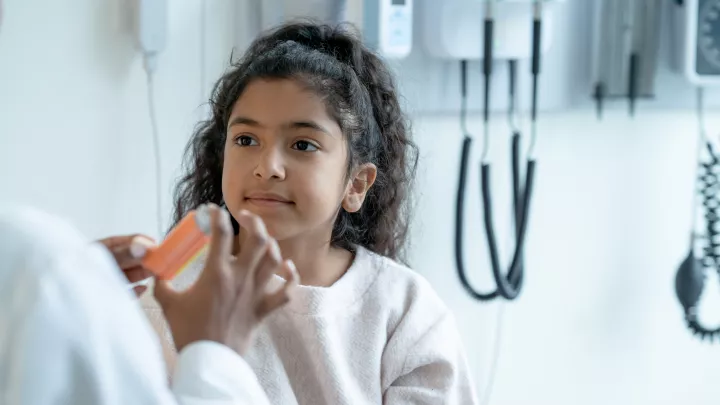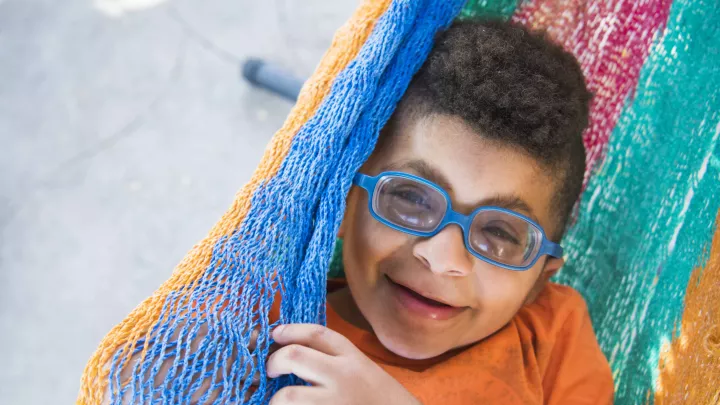The Division of Clinical Immunology and Allergy combines innovative treatment, research, education and outreach in the care of children with severe allergic disease, asthma, primary immune deficiency disorders and HIV/AIDS.
Our physicians work closely with each child's primary care physician to provide a full range of personalized clinical services. Each year, over 4,000 patients are seen in our outpatient clinics.
Programs and Services
Asthma and Allergy Program
The Division of Clinical Immunology and Allergy provides special clinical services for all allergic diseases.
Disorders Treated
Disorders treated include:
- Asthma
- Atopic Dermatitis
- Drug sensitivity
- Food allergy allergic rhinitis
- Stinging insect sensitivity
- Urticaria
Treatment Modalities Used
We use all relevant treatment modalities, from pharmacotherapy and immuno-therapy to dietary manipulation and allergen/irritant avoidance measures.
Special Care for Asthma
The Division of Clinical Immunology and Allergy is dedicated to the comprehensive care of asthma and related disorders.
Special Services for Asthma
- Diagnostic testing
- Treatment
- Community Education
- Healthcare Provider Education
Patients Treated
While patients of all ages and severity levels are welcome, our emphasis is on the treatment of children with severe asthma and/or those who have other complicating medical conditions.
Resources
- Community Asthma Project - Division's website on asthma education for all age groups, including individuals with low or no literacy skills.
- Kids in the House - Educational video with Dr. Ferdman on the common signs of food allergies.
Atopic Dermatitis Program
The Atopic Dermatitis Program in the Division of Clinical Immunology and Allergy at Children's Hospital Los Angeles emphasizes proactive medical and psychosocial interventions for atopic dermatitis or eczema. Patients with moderate to severe atopic dermatitis may experience chronic infections, irritation, embarassment. Our staff educates the patients and parents how to care and control the disease.
Frequently Asked Questions:
- What is atopic dermatitis?
- What are the symptoms of eczema?
- How is eczema diagnosed?
- Treatment for eczema?
- Management of eczema symptoms?
New patients are evaluated for atopic dermatitis triggers, which may include infections, food allergies and inhalant allergens. Tests provided include standard skin testing, RAST testing and food challenges.
Disorders Treated
- Atopic dermatitis
- Eczema
- Dry, itchy skin
- Skin allergies
- Skin disease
- Staphylococcus aureus
Our Services
- Clinical appointments
- Physical examination
- Environmental and diagnostic testing
- Blood testing and food challenge
- Management plan
Special Care for Children
Atopic dermatitis is very common; however, there is no cure, so our staff understands the frustrations the patient goes through. We work with patients and parents to determine a care plan to help improve their quality of life. Treatments such as bathing, prescriptions, ointments and other options will help descrease the urges to itch or scratch the irritated skin.
Research
Combining a commitment to research and education, Dr. Ong and his team discovered that atopic dermatitis patients have a low level of natural skin antibiotic called definsin that may explain why they are more prone to skin infections. His research interests are geared toward solving clinical problems including Staphylococcus aureus skin infections, food allergies, development of asthma and differential diagnosis of atopic dermatitis.
Designed for patients who have not responded to conventional therapy, the program offers the option of enrollment in ongoing clinical trials. We are part of the Atopic Dermatitis Research Network.
AIDS/HIV
Children's AIDS Center
In 1983, physicians at Children's Hospital Los Angeles identified the first case of pediatric AIDS in Southern California. Since then, Children's Hospital Los Angeles has become the largest pediatric AIDS and HIV care provider in the western United States, currently treating more than 300 children, adolescents and their families in the Hemophilia, Adolescent Medicine and Allergy/Immunology programs.
The Children's AIDS Center is a multidisciplinary, coordinated and comprehensive program for the treatment of AIDS and HIV infections in youth between the ages of 12 and 23. The program focuses on the multiple and unique needs of HIV-infected children through a family-centered approach.
Combining a commitment to research and education that results in the highest quality clinical care, the Children's AIDS Center offers patients the hope of early detection, prompt treatment, fewer opportunistic infections and a better quality of life.
The program is a designated AIDS Clinical Trial Group (ACTG) Pediatric Sub-Unit through the National Institute of Allergy and Infectious Disease.
HIV infection in children and adolescents differs from that of adults because it is often difficult to diagnose, as symptoms are nonspecific. These young patients experience failure to thrive, recurrent opportunistic infections and abnormalities that affect growth, motor development and the central nervous system.
HIV/AIDS Care
Children, teenagers and young adults with HIV infection receive comprehensive medical and psychosocial care at Children's Hospital Los Angeles. Medical services include coordinated clinical care, confidential HIV antibody testing, medical evaluation, nutritional counseling, pre- and post-test counseling, pharmacy, hospitalization if necessary and investigational therapies (clinical trials) and specialty referrals, as needed.
Psychosocial services include comprehensive case management, individual, partner and family counseling, health education, neuropsychological evaluation, support groups for youth, support groups for parents/guardians and referral to community resources.
In addition, the Children's AIDS Center provides community outreach services including community advisory boards, community education programs, consultation to district school boards, clinical training for physicians, psychologists, nurses and social workers and the University Children Medical Group Speakers Bureau.
Services for HIV-infected children, teenagers and young adults are available in specialized multidisciplinary ambulatory care services at Children's Hospital Los Angeles.
Clinical Immunology Service - Division of Clinical Immunology and Allergy
The Clinical Immunology Service provides coordinated comprehensive care for infants and children under 16 years who are HIV-infected or at risk through perinatal transmission or through transfusions received prior to the screening of blood for HIV antibodies.
Risk Reduction - Division of Adolescent Medicine
The Teenage Health Center in the Division of Adolescent Medicine provides comprehensive health care services to youths ages 12 through 23 years old who are HIV-infected or at risk of infection. Services are provided with sensitivity to the developmental needs of teenagers and their families.
The Division of Adolescent Medicine's Risk Reduction Program provides services designed to prevent the spread of HIV infection among youth utilizing the Division services. Homeless and runaway youth, pregnant teens and teen parents are high priorities.
A street outreach team provides curbside counseling about AIDS and risk reduction behaviors to youth on the street. Referrals for shelter, health care and social services are also provided by outreach workers. A team that includes youth educators provides group education and skill building sessions to pregnant teens and teen parents at schools and community agencies.
Case Management
The Los Angeles Family AIDS Network (LAFAN) is a federally funded Pediatric AIDS Demonstration Project for Los Angeles County. It provides comprehensive case management services at Children's Hospital Los Angeles and six other hospital-based pediatric AIDS programs.
Mental Health Services
The Division of Adolescent Medicine provides mental health services to youth living with HIV and youth affected by HIV. Psychologists provide individual, couple, family and group counseling.
Research
Since there is currently no cure for AIDS, clinical research studies represent AIDS patients' best hope. At Children's Hospital Los Angeles, physicians, scientists and health care professionals are involved in basic science and clinical research of standard and agents and combinations of investigational therapies for HIV/AIDS and opportunistic infections.
How to Find Us
Children's AIDS Center
To Division of Clinical Immunology and Allergy:
From Main Hospital Entrance:
Stop at Information Desk to receive visitor badge.
Turn left into first hallway and walk to the end of the hallway.
Enter the Outpatient Tower by taking the ramp to the bridge (Note: You will automatically be on the 3rd floor).
Upon entering the Outpatient Tower, turn left from the information desk, to Allergy/Immunology Clinic.
Division of Adolescent Medicine
The Division of Adolescent Medicine is in the Citibank building at 5000 Sunset Boulevard, 4th floor, located ½ mile West of Children's Hospital at the corner of Alexandria Street and Sunset Boulevard. Parking is available for a fee in the building parking lot. Enter the parking structure on Alexandria Street.
From Southbound 101
Exit Sunset Boulevard.
Left (east) on Sunset Boulevard.
Citibank building will be on your right-hand side, on the corner of Sunset Boulevard and Alexandria Street.
From Northbound 101
Exit Vermont Avenue.
Right (north) on Vermont Avenue to Sunset Boulevard.
Left (west) on Sunset Boulevard.
Citibank building will be on your left-hand side, on the corner of Sunset Boulevard and Alexandria Street.
From Interstate 5
Exit Los Feliz Boulevard.
West on Los Feliz to Hillhurst.
Left (south) on Hillhurst to Sunset Boulevard.
Right (west) on Sunset Boulevard.
Citibank building will be on your left-hand side, on the corner of Sunset Boulevard and Alexandria Street.
Clinical Immunology Service
Our physicians employ advanced clinical and medical techniques to diagnose, evaluate and manage primary immune deficiency disorders (PIDS) in children.
Disorders routinely seen include:
- Combined immune deficiency
- Agammaglobulinemia
- Common variable immunodeficiency
- Selective antibody deficiency
- Chronic granulomatous disease
- Ataxia telangectasia
- Hyper-IgE
Food Allergy Care
At the Gores Family Allergy Center, our team of board-certified doctors, nurses and staff deliver the highest quality patient-centered care and clinical services available for allergy patients and their families while providing education and conducting research. Our Center is also part of the FARE Clinical Network of 28 centers across the country dedicated to food allergy care.
Learn more about the Gores Family Allergy Center
Jeffrey Modell Research and Diagnostic Program
In a joint awareness program, the Jeffrey Modell Foundation and Children’s Hospital Los Angeles created the Jeffrey Modell Research and Diagnostic Program as part of the Immunology and Allergy division to provide education on primary immune deficiencies. Our goal is to expand diagnostic and research capabilities, with a strong emphasis on a physician education and awareness campaign for children diagnosed with primary immunodeficiency (PI).
Diagnosis
We provided children with:
- Extensive diagnosis and treatment options; providing complex cases with special care.
- Support from on-site physicians, nutritionists and social workers.
- Access to 26 of the world’s premier PI research laboratories for evaluation.
Education and Awareness
While effective treatment exists for patients affected by these diseases, many patients are undiagnosed and untreated because of a lack of awareness by physicians. Our outreach priorities are to:
- Improve awareness of PI in the community, specifically with physician specialties that are likely to see complications of PI, but not realize the underlying cause.
- Disseminate collateral and mailings to hospitals and private practices throughout Southern California.
- Present at Grand Rounds and a Mini-Symposium focused on PI.
Research
- Kuo CY, Chase J, Lloret MG, Stiehm ER, Moore T, Aguilera MJ, Siles JL, Church JA. Newborn Screening for SCID Identifies Patients with Ataxia Telandiectasia. J Allergy Clin Immunol. 2013 Feb 26
- Cliffe ST, Bloch DB, Suryani S, Kamsteeg EJ, Avery DT, Palendira U, Church JA, Wainstein BK, Trizzino A, Lefranc G, Akatcherian C, Megarbané A, Gilissen C, Moshous D, Reichenbach J, Misbah S, Salzer U, Abinun M, Ong PY, Stepensky P, Ruga E, Ziegler JB, Wong M, Tangye SG, Lindeman R, Buckley MF, Roscioli T. Clinical, molecular, and cellular immunologic findings in patients with SP 110—associated venaocclusive disease with immunodeficiency syndrome. J Allergy Clin lmmunol. 2012;130:735-42
- Wang T, Ong P, Roscioli T, Cliffe ST, Church JA. Hepatic vena-occlusive disease with immunodeficiency (VODI): First reported case in the U.S. and identification of a unique mutation in SP11 0. Clin lmmunol. 2012;145:102-7
- Chase JM, Holland SM, Greenberg DE, Marshall-Batty K, Zelazny AM, Church JA. Acidomonas Methano/ica-associated necrotizing lymphadenitis in a patient with chronic granulomatous disease. J Clin lmmunol. 2012;32:1193-6
Primary Immunodeficiencies Diagnostic and Research Program
Through our partnership with the Jeffrey Modell Foundation, the Children’s Hospital Los Angeles Jeffrey Modell Diagnostic and Research Program for Primary Immunodeficiencies is constantly working to provide children and adolescents with leading-edge diagnosis and treatment options. Providing care for primary immunodeficiencies (PIs) is complex and requires a special set of expertise – all of which are offered at Children’s Hospital Los Angeles. Read more.
More Information
EpiPens for Patients with Severe Allergies
Through a unique partnership with EpiPals, a nonprofit organization that distributes EpiPens to those in need, Children’s Hospital Los Angeles is able to offer free EpiPens to patients being treated by allergy specialists at CHLA.
- Patients must be currently receiving care from a CHLA allergy specialist.
- Families’ income level must be low enough to qualify for the program.
- Children who are not currently patients of CHLA allergy specialists must seek a referral for care from their physician to be seen at CHLA.
Research Endeavors
Physicians from the Division work closely with others at our hospital to enhance our research activities. Collaborative efforts are ongoing with Research Immunology/Bone Marrow Transplantation (primary immune deficiency), Pulmonology (asthma), Gastroenterology (eosinophilic enteropathy), and General Pediatrics (primary immune deficiency). The pathobiology and management of severe atopic dermatitis is a major focus of the Division.
The Children's AIDS Center is collaborating at the national level with the International Maternal Pediatric Adolescent AIDS Clinical Trials Group (IMPAACT) through the University of Southern California, with NIH-funded investigators at UCLA, and with selected pharmaceutical companies to improve the care of Pediatric HIV/AIDS.
Similarly, studies involving patients with primary immune deficiency disorders, both sponsored and investigator-initiated, are ongoing.
Training Caregivers
The Division’s active educational component involves more than 100 medical students, residents, and fellows annually, along with lectures for community and school physicians and nurses.
Awards and Recognition
Drs. Church, Ferdman and Ong have been recognized in:
- Best Doctors in America
- America's Top Doctors
- Pasadena Magazine "Top Doctors"
Dr. Church has been recognized with an institutional award:
- H. Russell Smith Research Award



